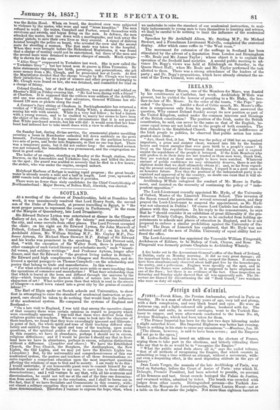SCOTLAND.
At a meeting of the electors of Dumfriesshire, held at Dumfries last week, it was unanimously resolved that Lord Henry Scott, the second son of the Duke of Buceleuch, at present travelling in Egypt, "the moot proper person to represent the county in Parliament,' in the room of the Marquis of Queensbury, late Lerd Drumlartrt
Sir-Edward Pithier Lytton was entertained at dinner in the Glasgow Gallery of Art, on the 16th, by "all the talents" and respeetabilities of the city, and some recruits from other places. The Lord Provost occupied
the chair; on his right sat Sir Edward Lytton, Sir John Maxwell of Pollock, Colonel Hamley, Mr. Cumming Bruce M.P.; on his left, Sir Archibald Alison, Mr. William Stirling M.P., Mr. Cayley M.P., Professor Aytoun, Sir Michael Shaw Stewart M.P. Eulogy of Sir Edward and his works was prominent in the speaking. The Lord Provost said, that, "with the exception of Sir Walter Scott, there is perhaps no other example of such varied literary and scholastic merit," such "beauti ful verses, and sublime writings. And Professor Aytoun, longer after dinner, said that Sir Edward is the greatest living author in Britain."
Sir Edward paid high compliments to Glasgow and Scotehmen and delivered a special panegyric on Thomas Campbell—on the scholarship and poetry that belong to trade and manufactures. In this wise " For what scholarship and what poetry more noble or more touching than the operations of commerce and manufacture ? What finer scholarship than
that which is learnt at the loom and diffused through the universe by the ship—which translates the darkest riddles of nature into the luminous characters of art ? What nobler poem than that which is read in the streets of Glasgow—a small town raised into a great city by the genius of creative labour ?"
The Earl of Elgin spoke on Scotch schools and Universities, to show that in attempting to raise the standard of academical instruction as pro
posed, care should be taken to do nothing that would limit the influence of the academical system. He compared the systems of England and Scotland " On a late visit to England, I was told that among the operative classes of that country there were certain opinions in regard to .property which were exceedingly unsound. I was told that these weie derived from their religious guides and teachers. When we came to look into the character of those teachers, we found that they were exceedingly ignorant and illiterate ; in point of fact, the whole spirit and tone of their teaching differed absolutely and entirely from the spirit and tone of the teaching, upon social questions, of the spiritual in of the classes immediately above them. In this country, we have in abundance, perhaps I should say M excess, religious differences; and if I would be precise I should say that in Scotland here we have m abundance, perhaps in excess, religious distinctions without a difference. (Laughter and cheers.) We have the Established Church, the Free Church, the Burghers, the Antiburghers the New Lights, the Old Lights, and we may yet have the Electric 'Lights too. (Laughter.) But, by the universality and comprehensiveness of this our academical system, the pastors and teachers of all these denominations re
ceive together a competent education upon the most important questions
affecting the relations of man to God and to society. I am ready to do this : I would undertake, if our honourable guest were to commit himself for an indefinite number of Sabbaths to my care, to carry him to these different denominations; and I will venture to say that, with all his acuteness and discrimination, he could not tell me at the end of the time one denomina tion from another. We come to the conclusion, and I shall be borne out in the fact, that if we have Socialists and Communists in this country, without almost a solitary exception they are not connected with one or other of these denominations. Therefore I venture to express the hope, 'that, when we undertake to raise the standard of our academical instruction, to multiply inducements to young men to turn themselves to learning and science, we shall be careful to do nothing to limit the inlluence of the academical system."
Speeches by Sir Archibald Alison, Mr. Stirling M.P., Sir Michael Stewart, and a Frenchman Lieutenant Melville, completed the oratorical display. After which came calm) in "the West room."
The movement for extension of the suffrage in Scotland has been stimulated by the advent of a deputation from London and Birmingham —Mr. Beale and Mr. James Taylor ; whose object it is to explain the operation of the freehold land societies. A second public meeting to advance Dr. Begg's views was held at Edinburgh on Saturday, in tho Queen Street Rail; when Mr. Beale and Mr. Taylor performed the task allotted to them. There was a strong attendance of the leaders of the party ; and Dr. Begg's propositions, which have already obtained the assent of the Town Council, were adopted.


































 Previous page
Previous page